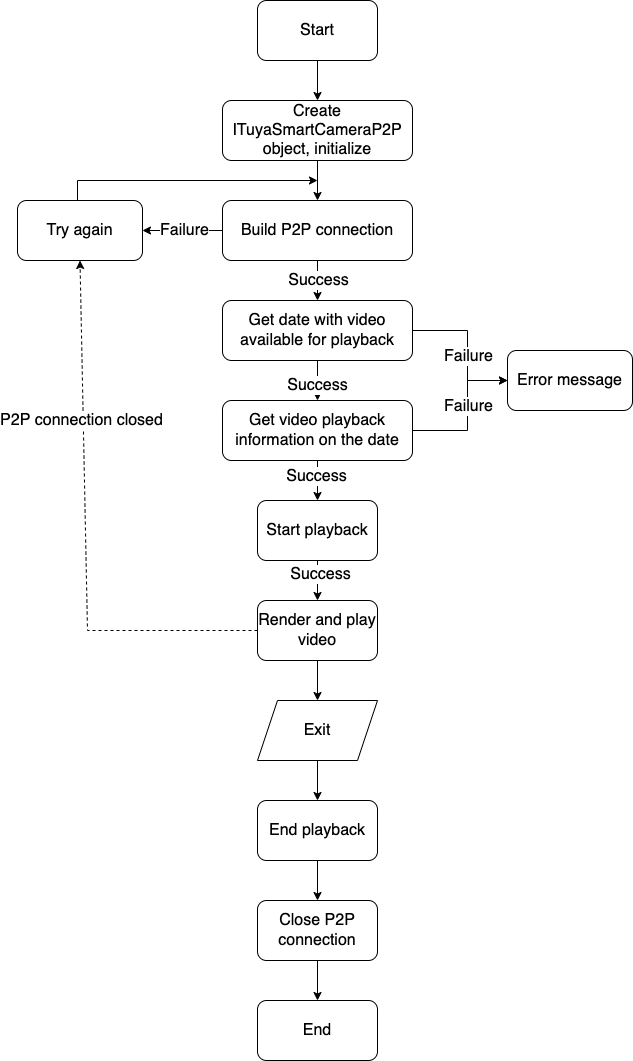Memory Card Recording
Last Updated on : 2024-06-19 04:10:51download
Users can view recorded footage from the smart camera’s memory card on the app through the IPC SDK.
You need to do the following before starting playback:
-
Create an
IThingSmartCameraP2Pobject and connect to the peer-to-peer (P2P) channel. -
Once the P2P channel is established, users can search for video clips on the camera’s memory card by time frame and play them.
-
During playback, users can access audio and video features like starting/stopping recording, screenshot, and muting sound. For more information, see Audio and Video.

Core methods
| Demo | Class | Method | Description | Notes |
|---|---|---|---|---|
| IThingSmartCameraP2P | queryRecordDaysByMonth | Query the dates when recordings exist. | Before playback, query the dates when recordings exist in the specified month and year. | |
| IThingSmartCameraP2P | queryRecordTimeSliceByDay | Query video clips on the specified date. | After obtaining the dates when video clips exist, query the clips by date. | |
| IThingSmartCameraP2P | startPlayBack | Start playback. | Error codes | |
| IThingSmartCameraP2P | stopPlayBack | Stop playback. | - | |
| IThingSmartCameraP2P | disconnect | Disconnect. | When not in use, disconnect the P2P connection to free up resources. |
Important notes
It is recommended not to call other methods of the IThingSmartCameraP2P object within this object’s callback, which may be asynchronously called. Otherwise, a deadlock might occur.
Core code
Query the dates when recordings exist
void queryRecordDaysByMonth(int year, int month, OperationDelegateCallBack callBack);
Query video clips by date
void queryRecordTimeSliceByDay(int year, int month, int day, OperationDelegateCallBack callBack);
Start playback
void startPlayBack(int startTime, int stopTime, int playTime, OperationDelegateCallBack callBack, OperationDelegateCallBack finishCallBack);
Stop playback
void stopPlayBack(OperationDelegateCallBack callBack);
Java:
// 1. Create IThingSmartCameraP2P
IThingSmartCameraP2P mCameraP2P = null;
IThingIPCCore cameraInstance = ThingIPCSdk.getCameraInstance();
if (cameraInstance != null) {
mCameraP2P = cameraInstance.createCameraP2P(devId));
}
ThingCameraView mVideoView = findViewById(R.id.camera_video_view);
// 2. Set the callback for the view rendering container.
mVideoView.setViewCallback(new AbsVideoViewCallback() {
@Override
public void onCreated(Object view) {
super.onCreated(view);
// When the rendering view is constructed, bind it to IThingSmartCameraP2P.
if (null != mCameraP2P){
mCameraP2P.generateCameraView(view);
}
}
});
// 3. Construct the rendering view.
mVideoView.createVideoView(devId);
// 4. Register a listener for P2P.
AbsP2pCameraListener absP2pCameraListener = new AbsP2pCameraListener() {
@Override
public void onSessionStatusChanged(Object camera, int sessionId, int sessionStatus) {
super.onSessionStatusChanged(camera, sessionId, sessionStatus);
// When sessionStatus = -3 (timeout) or -105 (authentication failed), try reconnecting and avoid loop.
}
};
if (null != mCameraP2P){
mCameraP2P.registerP2PCameraListener(absP2pCameraListener);
}
// 5. Connect to P2P.
if (null != mCameraP2P){
mCameraP2P.connect(devId, new OperationDelegateCallBack() {
@Override
public void onSuccess(int sessionId, int requestId, String data) {
// Connection successful. Send a message to the handler to return to the main thread and then initiate streaming.
}
@Override
public void onFailure(int sessionId, int requestId, int errCode) {
// Connection failed.
}
});
}
// 6. Start playback.
if (null != mCameraP2P){
mCameraP2P.startPlayBack(timePieceBean.getStartTime(),
timePieceBean.getEndTime(),
timePieceBean.getStartTime(), new OperationDelegateCallBack() {
@Override
public void onSuccess(int sessionId, int requestId, String data){
isPlayback = true;
}
@Override
public void onFailure(int sessionId, int requestId, int errCode){
isPlayback = false;
}
}, new OperationDelegateCallBack() {
@Override
public void onSuccess(int sessionId, int requestId, String data){
isPlayback = false;
}
@Override
public void onFailure(int sessionId, int requestId, int errCode){
isPlayback = false;
}
});
}
// 7. Stop releasing P2P sessions when the page is closed or playback is not used.
@Override
public void onDestroy() {
if (null != mCameraP2P) {
// Stop playback when not needed.
mCameraP2P.stopPlayBack(new OperationDelegateCallBack() {
@Override
public void onSuccess(int sessionId, int requestId, String data) {
}
@Override
public void onFailure(int sessionId, int requestId, int errCode) {
}
});
mCameraP2P.disconnect(devId,null);
mCameraP2P.removeOnP2PCameraListener(absP2pCameraListener);
mCameraP2P.destroyP2P();
}
}
Is this page helpful?
YesFeedbackIs this page helpful?
YesFeedback





